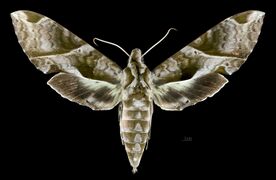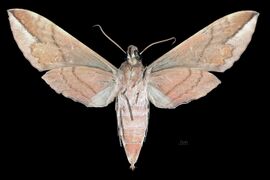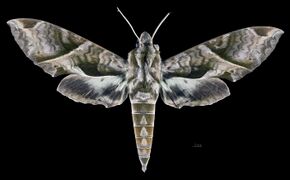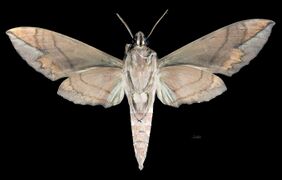Biology:Eumorpha anchemolus
| Anchemola sphinx moth | |
|---|---|
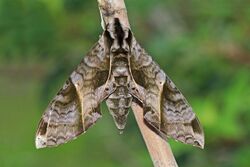
| |
| Mount Totumas cloud forest, Panama | |
| Scientific classification | |
| Domain: | Eukaryota |
| Kingdom: | Animalia |
| Phylum: | Arthropoda |
| Class: | Insecta |
| Order: | Lepidoptera |
| Family: | Sphingidae |
| Genus: | Eumorpha |
| Species: | E. anchemolus
|
| Binomial name | |
| Eumorpha anchemolus (Cramer, 1780)
| |
| Synonyms | |
| |
Eumorpha anchemolus, the anchemola sphinx moth, is a moth of the family Sphingidae. The species was first described by Pieter Cramer in 1780.[1]
Distribution
It is found from Argentina through Central America and into the US state of Texas .[2]
Description
The wingspan is 110-135 mm. It is a large species. It is similar to Eumorpha triangulum, but the forewing upperside pattern is less contrasting and variegated. There is a conspicuous white fringe on the forewing upperside, found along the posterior margin from near the base to beyond the median rhombiform patch.
Biology
Adults are on wing year round, except the coldest months. They nectar at various flowers.
The larvae feed on Cissus alata, Cissus pseudosicyoides, Cissus erosa, Vitis and Ampelopsis species.
References
- ↑ "CATE Creating a Taxonomic eScience - Sphingidae". Cate-sphingidae.org. Archived from the original on 2012-11-12. https://web.archive.org/web/20121112180244/http://www.cate-sphingidae.org/taxonomy/Eumorpha/anchemolus.html. Retrieved 2011-10-26.
 This article incorporates text from this source, which is in the public domain.
This article incorporates text from this source, which is in the public domain.
- ↑ "Eumorpha anchemolus". January 4, 2013. Archived from the original on 2013-05-12. https://web.archive.org/web/20130512011824/http://www.silkmoths.bizland.com/eanchemo.htm. Retrieved 2011-10-26.
External links
| Wikimedia Commons has media related to Eumorpha anchemolus. |
- Fauske, Gerald M. (January 23, 2007). "Eumorpha anchemola (Cramer 1779)". Department of Entomology North Dakota State University. https://www.ndsu.edu/ndmoths/ndmoths/names/7857.htm.
Wikidata ☰ Q146201 entry
 |
